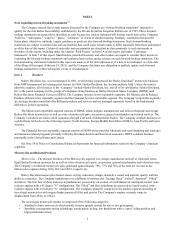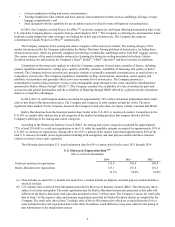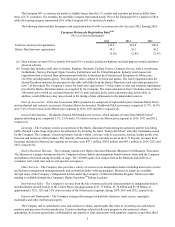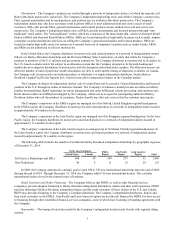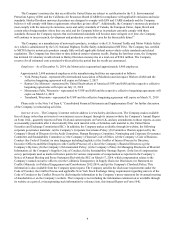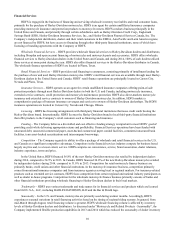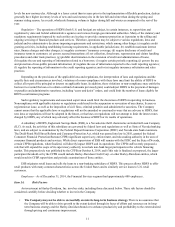Harley Davidson 2014 Annual Report Download - page 13
Download and view the complete annual report
Please find page 13 of the 2014 Harley Davidson annual report below. You can navigate through the pages in the report by either clicking on the pages listed below, or by using the keyword search tool below to find specific information within the annual report.
•Retail sales of the Company's independent dealers may be impacted by weather. The Company has observed that
abnormally cold and/or wet conditions in a region could have the effect of reducing demand or changing the timing for
purchases of new Harley-Davidson motorcycles. Reduced demand for new Harley-Davidson motorcycles ultimately
leads to reduced shipments by the Company.
•The Company must comply with governmental laws and regulations that are subject to change and involve
significant costs. The Company’s sales and operations in areas outside the U.S. may be subject to foreign laws,
regulations and the legal systems of foreign courts or tribunals. These laws and policies governing operations of
foreign-based companies may result in increased costs or restrictions on the ability of the Company to sell its products
in certain countries. The Company’s international sales operations may also be adversely affected by U.S. laws
affecting foreign trade and taxation.
The Company’s domestic sales and operations are subject to governmental policies and regulatory actions of agencies
of the United States Government, including the Environmental Protection Agency (EPA), SEC, National Highway
Traffic Safety Administration, Department of Labor and Federal Trade Commission. In addition, the Company’s sales
and operations are also subject to laws and actions of state legislatures and other local regulators, including dealer
statutes and licensing laws. Changes in regulations or the imposition of additional regulations may have a material
adverse effect on the Company’s business and results of operations.
Tax - The Company is subject to income and non-income based taxes in the U.S. and in various foreign jurisdictions.
Significant judgment is required in determining the Company's worldwide income tax liabilities and other tax
liabilities. The Company believes that it complies with applicable tax law. If the governing tax authorities have a
different interpretation of the applicable law or if there is a change in tax law, the Company's financial condition and/
or results of operations may be adversely affected.
Environmental - The Company’s motorcycle products use internal combustion engines. These motorcycle products are
subject to statutory and regulatory requirements governing emissions and noise, including standards imposed by the
EPA, state regulatory agencies, such as California Air Resources Board, and regulatory agencies in certain foreign
countries where the Company’s motorcycle products are sold. The Company is also subject to statutory and regulatory
requirements governing emissions and noise in the conduct of the Company’s manufacturing operations. Any
significant change to the regulatory requirements governing emissions and noise may substantially increase the cost of
manufacturing the Company’s products. If the Company fails to meet existing or new requirements, then the Company
may be unable to sell certain products or may be subject to fines or penalties. Further, in response to concerns about
global climate changes and related changes in consumer preferences, the Company may face greater regulatory or
customer pressure to develop products that generate less emissions. This may require the Company to spend additional
funds on research, product development, and implementation costs and subject the Company to the risk that the
Company’s competitors may respond to these pressures in a manner that gives them a competitive advantage.
Financial Services - The Company’s financial services operations are governed by various foreign, federal and state
laws that more specifically affect general financial and lending institutions. The financial services operations originate
the majority of its consumer loans through its subsidiary, Eaglemark Savings Bank, a Nevada state thrift chartered as
an industrial loan company. Congress has previously considered and may in the future impose additional regulation
and supervision over the financial services industry.
Depending on the provisions of the applicable laws and regulations, the interpretation of laws and regulations and the
specific facts and circumstances involved, violations of or non-compliance with these laws may limit the ability of
HDFS to collect all or part of the principal or interest on applicable loans, may entitle the borrower to rescind the loan
or obtain a refund of amounts previously paid, could subject HDFS to payment of damages or penalties and
administrative sanctions, including "cease and desist" orders, and could limit the number of loans eligible for HDFS
securitizations programs. Such regulatory requirements and associated supervision could limit the discretion of HDFS
in operating its business. Noncompliance with applicable statutes or regulations could result in the suspension or
revocation of any charter, license or registration at issue, as well as the imposition of civil fines, criminal penalties and
administrative sanctions. The Company cannot assure that the applicable laws or regulations will not be amended or
construed in ways that are adverse to HDFS, that new laws and regulations will not be adopted in the future, or that
laws and regulations will not attempt to limit the interest rates charged by HDFS, any of which may adversely affect
the business of HDFS or its results of operations.
In 2010, the Dodd-Frank Wall Street Reform and Consumer Protection Act€(Dodd-Frank Act) was passed into law.
The Dodd-Frank Act is a sweeping piece of legislation, and the financial services industry is still assessing the
13


